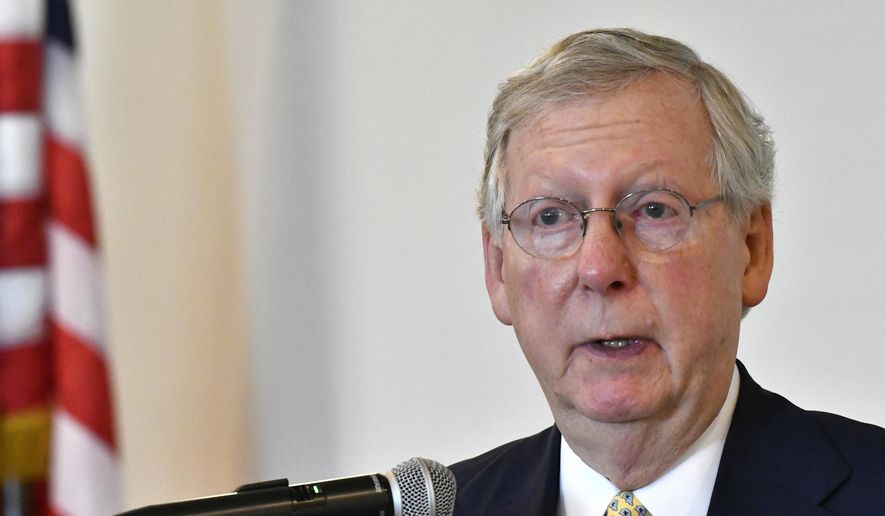Senate Majority Leader Mitch McConnell abruptly canceled nearly half of the Senate’s summer vacation Tuesday, saying he will force lawmakers to stick around the humid confines of Washington in order to give Congress more time to make progress on President Trump’s agenda.
Passing a budget, repealing Obamacare and beginning work on tax reform are at the top of the to-do list, but Mr. McConnell also said keeping lawmakers in Washington will help eat into the massive backlog of presidential nominations that has grown with Democrats’ unprecedented obstruction.
Canceling vacation is a seismic shift for lawmakers who treasure their time away from Washington, but Mr. McConnell said Democrats’ opposition has made it difficult for the Senate to conduct business.
“There are other things that we have to do, and we only have a limited number of days left,” Mr. McConnell said. “We intend to fully utilize the first two weeks in August.”
He made the decision after rank-and-file Republicans said they would be embarrassed to return home and face constituents without having made a bigger dent in their agenda.
“I don’t believe the Senate should go home if we haven’t done our job,” said Sen. Ted Cruz, Texas Republican.
Vacations have been abbreviated before, but usually when Congress is facing an immediate spending deadline that could result in a government shutdown. Giving up two weeks of summer vacation to pursue a broader policy agenda is rare.
Senate Minority Leader Charles E. Schumer, New York Democrat, said Republicans are trying to mask their own legislative failures.
“They’re struggling with health care. They don’t want to go home and face their constituents,” Mr. Schumer said.
“So what Mitch McConnell’s trying to do is sort of say to them, ’Well, if you don’t do it in two weeks, we may have to stay here,’” he said. “The problem is not the timing; it’s the substance.”
One major sticking point is nominations.
Democrats have erected obstacles to the quick approval of most of Mr. Trump’s nominees, forcing the Senate to eat up floor time on repeated filibuster votes.
Mr. Trump has submitted 178 nominations, but only 46 of them have been confirmed. President Obama had 183 nominees confirmed by this point in his first term, Mr. McConnell said.
“We’re getting zero cooperation on the personnel part of the Senate’s portfolio, which is confirming nominations,” the Kentucky Republican told reporters.
Mr. Schumer said Mr. Trump is to blame for the low number of confirmations because he hasn’t sent the Senate enough names.
Sen. Ron Johnson, Wisconsin Republican, said he didn’t see the recess announcement as a desperation move.
“I think it’s just a realization: We have a lot of work to do and very little time, and the Democrats aren’t cooperating in the slightest,” he said.
“I have no problem with it whatsoever. I would have liked to [have] stayed in last week, quite honestly, to have greater input in terms of what the final Senate bill was,” Mr. Johnson said.
Senators returned Monday from a 10-day break to celebrate Independence Day. They had been slated to leave Capitol Hill on July 28 and return after Labor Day. The new schedule keeps them in Washington until Aug. 11.
House Republican leaders haven’t said whether they will follow suit, but they are under increasing pressure from conservatives who say Congress must work through the summer.
“There are too many unresolved issues before Congress, including tax reform, health care, the debt ceiling, government funding and more, to leave Washington before the people’s work is done,” the House Freedom Caucus said in a statement. “It is imperative that the additional weeks are coupled with decisive action.”
Conservative activists said they hoped that adding more time to the schedule would help break Democrats’ resistance.
“It’s time for the Democrats’ collective temper tantrum to end, and Sen. McConnell must continue to ratchet up the pressure so that President Trump’s nominees and agenda have a chance of being considered,” said Rick Manning, president of the group Americans for Limited Government.
Senators plan to spend this week and next rewriting and then debating the Republican bill to repeal Obamacare.
After that, Mr. McConnell said, they will turn to the annual defense policy bill and then could move to raise the federal government’s borrowing limit. Analysts said that must be accomplished by October.
Congress also faces a Sept. 30 deadline to approve funding for basic government operations in fiscal year 2018, and Republicans need to pass a new budget to streamline the process for tax reform, which House leaders are planning this year.
• David Sherfinski can be reached at dsherfinski@washingtontimes.com.




Please read our comment policy before commenting.